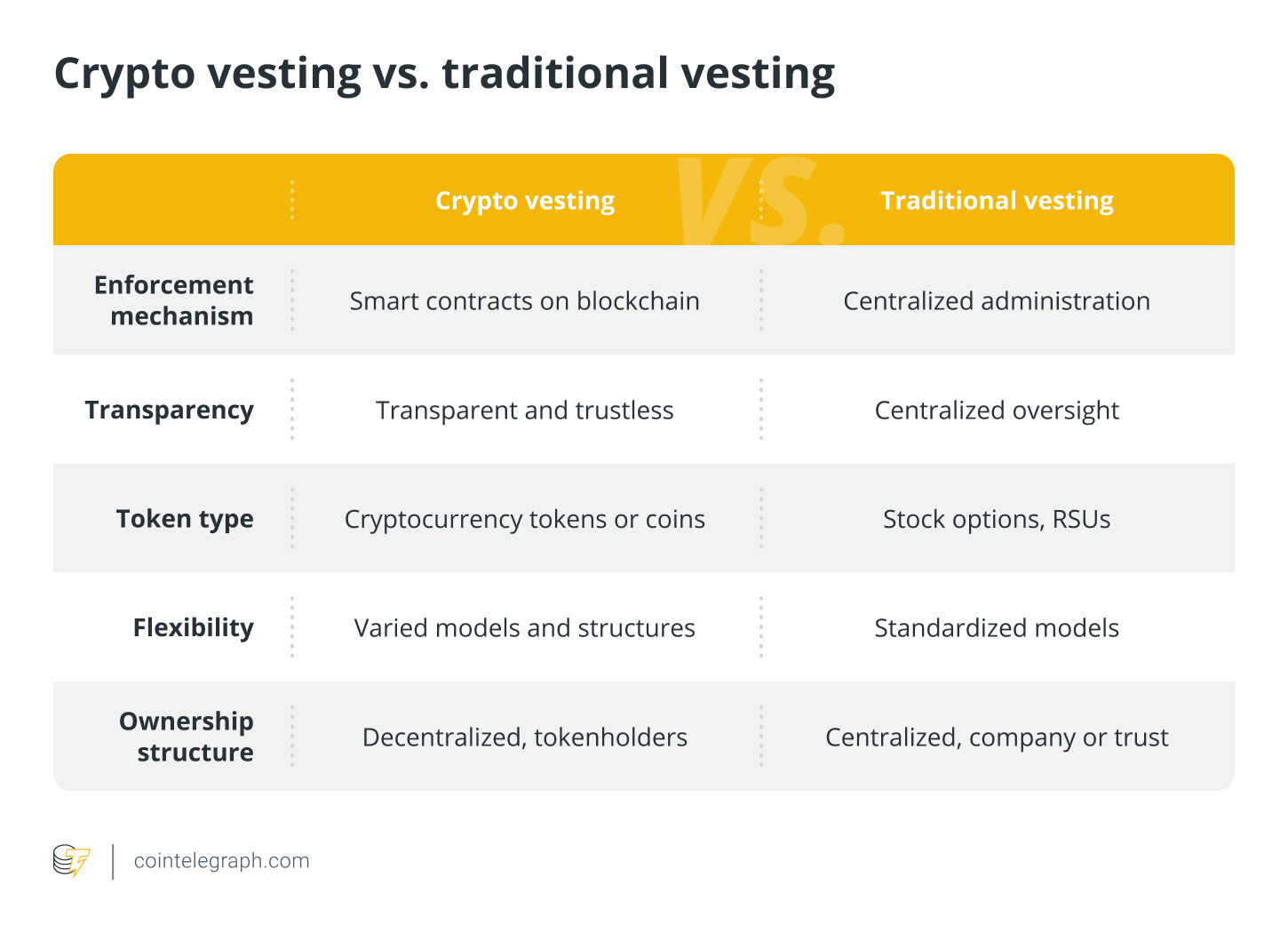[ad_1]
What’s crypto vesting?
The method of locking down cryptocurrency tokens or cash for a predetermined period of time earlier than permitting the tokenholder to totally entry or switch them is named crypto vesting.
It’s generally utilized in initial coin offerings (ICOs), token gross sales and different cryptocurrency-related fundraising activities. Crypto vesting goals to incentivize long-term dedication and deter early buyers or workforce members from unexpectedly promoting their tokens for a revenue after which leaving the enterprise. People or entities that get tokens regularly acquire entry to them over time, often at predetermined intervals, by imposing a vesting period.
Whereas vesting schedules are topic to vary, they often include a ready interval (generally known as the cliff) adopted by common intervals of launch. Tokens could, as an illustration, have a one-year cliff after which be made out there in equal month-to-month funds after that.
Vesting is continuously utilized to:
- Staff and advisers: To make sure the workforce members’ and advisers’ continued dedication to the challenge, tokens given to challenge builders could also be topic to vesting.
- Traders: Early buyers in an ICO or token sale may be topic to vesting intervals to discourage short-term hypothesis.
- Founders: To match their pursuits with the challenge’s long-term efficiency, a challenge’s founders or core workforce members could have their tokens vested.
Smart contracts on the blockchain are often used to implement vesting, guaranteeing that the laws are clear and robotically utilized. This mechanism helps construct belief among the many group and buyers, because it reveals a dedication from key stakeholders to the challenge’s success in the long run.
Sometimes, tokens are unlocked through varied strategies following their vesting interval. On this course of, tokens beforehand locked for a predetermined interval are launched. Tokenholders can progressively entry their belongings over time because of this unlocking, which continuously occurs in levels or increments. Launch circumstances might embrace assembly milestones, a time-based schedule or reaching efficiency metrics.
Forms of vesting in crypto
The various kinds of vesting within the crypto area embrace time-based, milestone-based, hybrid and reverse vesting.
Time-based vesting
With time-based vesting, tokens are progressively launched to holders over a set period of time. For example, Ethereum carried out a time-based vesting system for its early backers. A number of publicly accessible good contracts allow the gradual vesting of ERC-20 tokens, similar to these allocated to founders in a crowdsale. Nonetheless, there isn’t an equal methodology for vesting “uncooked” Ether (ETH), which is distinct from wrapped Ether.
Uncooked Ether sometimes refers back to the native cryptocurrency on the Ethereum blockchain in its unaltered state. Not like representations of Ethereum on different blockchains, similar to wrapped Ether on the Ethereum community or ERC-20 tokens representing Ether on different networks, it’s not tokenized or wrapped. This authentic Ethereum isn’t suitable with some functionalities or good contracts tailor-made for tokens and requires particular mechanisms for vesting, which aren’t as available as for tokenized belongings.
Milestone-based vesting
With milestone-based vesting, token distribution is contingent upon carrying out explicit challenge aims or benchmarks. Some blockchain tasks could implement a vesting system contingent on milestones for his or her companions and workforce members.
For instance, a proportion of the allotted tokens could also be distributed upon the profitable implementation of a specific function, the profitable conclusion of a protocol replace or different noteworthy challenge milestones.
Hybrid vesting
Hybrid vesting combines components of each time-based and milestone-based vesting. Blockchain tasks typically make use of a blended vesting mannequin for token allocation. A section of tokens assigned to the workforce and preliminary supporters follows a time-based vesting plan, unlocking regularly over a set length.
Concurrently, one other section is tied to the challenge’s achievement of predetermined milestones. This twin strategy ensures concord with challenge aims and acknowledges long-term dedication and success milestones.
Reverse vesting
Beneath the notion of “reverse vesting,” tokens {that a} recipient initially owns could also be forfeited if particular necessities usually are not fulfilled — the other of typical vesting. Filecoin used reverse vesting for its Easy Settlement for Future Tokens (SAFT) customers.
Mining rewards are distributed in accordance with a schedule that promotes long-term community alignment: 25% of block rewards are launched instantly to enhance miner money circulation, and 75% of block rewards vest gradually over 180 days. Protocol Labs groups and the Filecoin Basis will obtain further Filecoin (FIL) tokens over six years, whereas SAFT buyers will obtain their tokens over three years.
Crypto vesting vs. conventional monetary vesting fashions
Whereas crypto vesting leverages blockchain expertise for transparency and automation, conventional monetary vesting depends on centralized administration to attain related targets inside the conventional company framework.
Cryptocurrency vesting fashions share similarities with conventional monetary vesting fashions but additionally exhibit distinct options as a result of distinctive nature of blockchain-based belongings. Within the cryptocurrency world, vesting is usually completed through blockchain-based good contracts that present automated and clear vesting rule enforcement.
Aligning the pursuits of tokenholders — similar to buyers, advisers and challenge groups — with the challenge’s long-term development and success is the primary goal of crypto vesting. In conventional finance, equity-based compensation plans, similar to inventory choices and restricted inventory models (RSUs), are continuously related to vesting.
Conventional vesting strategies are sometimes managed via centralized methods by companies and monetary establishments, in distinction to crypto vesting, which continuously makes use of good contracts on decentralized platforms.
Time-based vesting in conventional finance often entails a ready interval earlier than executives or employees totally personal the shares they’ve been awarded. By associating a portion of an worker’s pay with their steady employment, this promotes worker retention and loyalty. Though milestone-based vesting is much less typical in conventional finance, it may well occur in some performance-based inventory packages the place shares are launched solely after predefined enterprise targets are met.

How does token vesting affect the token provide?
Token vesting manages the gradual launch of tokens into circulation, impacting the out there provide and market dynamics.
By controlling the availability of tokens out there out there over time, token vesting straight impacts the circulating token supply. Tokens which are vesting-related are often not instantly out there for buying and selling or circulation.
Due to this, till these tokens are totally vested, they aren’t thought to be a part of the out there provide. The circulating provide is decreased in the course of the vesting interval, which impacts metrics like market capitalization and out there liquidity.
Tokens enter the circulating provide after they progressively unlock or vest by preset schedules or circumstances. This may affect market dynamics, investor sentiment and the ecosystem’s supply-demand stability.
Advantages of crypto vesting
Crypto vesting, powered by good contracts, ensures clear, versatile and safe alignment of stakeholder pursuits with long-term challenge success, fostering investor confidence.
Crypto vesting affords a number of advantages within the blockchain area. Through the use of good contracts in decentralized networks, vesting necessities could also be enforced transparently and robotically, which builds belief amongst tokenholders.
The pursuits of groups, advisers and buyers are aligned with the long-term success of the challenge via time-based and milestone-based vesting mechanisms. As a result of crypto vesting is versatile, tasks can customise methods to fulfill their distinctive necessities, which inspires accountability and dedication.
Moreover, using blockchain technology makes the method safer by being impervious to centralized manipulation and tampering. All issues thought of, crypto vesting is crucial for fostering long-term challenge improvement, lowering speculative exercise and fostering investor confidence.
Dangers and challenges related to crypto vesting
Regulatory uncertainties, good contract vulnerabilities, liquidity dangers, lack of standardization and balancing incentives pose challenges to the effectiveness of crypto vesting.
Crypto vesting affords vital incentives, but it surely additionally poses dangers and difficulties. Authorized issues could come up from regulatory uncertainties within the growing cryptocurrency ecosystem which will have an effect on the enforcement of vesting contracts.
Token holdings might be compromised by smart contract flaws and code mistakes that end in sudden outcomes or safety breaches. As soon as unlocked, the liquidity threat hooked up to vested tokens could trigger abrupt market swings and even sell-offs.
Moreover, buyers could develop into confused if vesting procedures usually are not uniform amongst tasks. Discovering the best stability between acknowledging dedication and guaranteeing challenge success is a continuing battle. General, correctly negotiating the complexity of crypto vesting requires cautious consideration of authorized, technological and market-related issues.
[ad_2]
Source link





